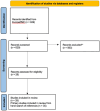Benchmarking the clinical outcomes of Healthentia SaMD in chronic disease management: a systematic literature review comparison
- PMID: 39776481
- PMCID: PMC11703908
- DOI: 10.3389/fpubh.2024.1488687
Benchmarking the clinical outcomes of Healthentia SaMD in chronic disease management: a systematic literature review comparison
Abstract
Background: Software as a Medical Device (SaMD) and mobile health (mHealth) applications have revolutionized the healthcare landscape in the areas of remote patient monitoring (RPM) and digital therapeutics (DTx). These technological advancements offer a range of benefits, from improved patient engagement and real-time monitoring, to evidence-based personalized treatment plans, risk prediction, and enhanced clinical outcomes.
Objective: The systematic literature review aims to provide a comprehensive overview of the status of SaMD and mHealth apps, highlight the promising results, and discuss what is the potential of these technologies for improving health outcomes.
Methods: The research methodology was structured in two phases. In the first phase, a search was conducted in the EuropePMC (EPMC) database up to April 2024 for systematic reviews on studies using the PICO model. The study population comprised individuals afflicted by chronic diseases; the intervention involved the utilization of mHealth solutions in comparison to any alternative intervention; the desired outcome focused on the efficient monitoring of patients. Systematic reviews fulfilling these criteria were incorporated within the framework of this study. The second phase of the investigation involved identifying and assessing clinical studies referenced in the systematic reviews, followed by the synthesis of their risk profiles and clinical benefits.
Results: The results are rather positive, demonstrating how SaMDs can support the management of chronic diseases, satisfying patient safety and performance requirements. The principal findings, after the analysis of the extraction table referring to the 35 primary studies included, are: 24 studies (68.6%) analyzed clinical indications for type 2 diabetes mellitus (T2DM), six studies (17.1%) analyzed clinical indications for cardiovascular conditions, three studies (8.7%) analyzed clinical indications for cancer, one study (2.8%) analyzed clinical indications for chronic obstructive pulmonary disease (COPD), and one study (2.8%) analyzed clinical indications for hypertension. No severe adverse events related to the use of mHealth were reported in any of them. However, five studies (14.3%) reported mild adverse events (related to hypoglycemia, uncontrolled hypertension), and four studies (11.4%) reported technical issues with the devices (related to missing patient adherence requirements, Bluetooth unsuccessful pairing, and poor network connections). For what concerns variables of interest, out of the 35 studies, 14 reported positive results on the reduction of glycated hemoglobin (HbA1c) with the use of mHealth devices. Eight studies examined health-related quality of life (HRQoL); in three cases, there were no statistically significant differences, while the groups using mHealth devices in the other five studies experienced better HRQoL. Seven studies focused on physical activity and performance, all reflecting increased attention to physical activity levels. Six studies addressed depression and anxiety, with mostly self-reported benefits observed. Four studies each reported improvements in body fat and adherence to medications in the mHealth solutions arm. Three studies examined blood pressure (BP), reporting reduction in BP, and three studies addressed BMI, with one finding no statistically significant change and two instead BMI reduction. Two studies reported significant weight/waist reduction and reduced hospital readmissions. Finally, individual studies noted improvements in sleep quality/time, self-care/management, six-minute walk distance (6MWD), and exacerbation outcomes.
Conclusion: The systematic literature review demonstrates the significant potential of software as a medical device (SaMD) and mobile health (mHealth) applications in revolutionizing chronic disease management through remote patient monitoring (RPM) and digital therapeutics (DTx). The evidence synthesized from multiple systematic reviews and clinical studies indicates that these technologies, exemplified by solutions like Healthentia, can effectively support patient monitoring and improve health outcomes while meeting crucial safety and performance requirements. The positive results observed across various chronic conditions underscore the transformative role of digital health interventions in modern healthcare delivery. However, further research is needed to address long-term efficacy, cost-effectiveness, and integration into existing healthcare systems. As the field rapidly evolves, continued evaluation and refinement of these technologies will be essential to fully realize their potential in enhancing patient care and health management strategies.
Keywords: Healthentia; chronic diseases; digital therapeutics (DTx); remote patient monitoring (RPM); software as medical device (SaMD).
Copyright © 2024 Kyriazakos, Pnevmatikakis, Kostopoulou, Ferrière, Thibaut, Giacobini, Pastorino, Gorini and Fenici.
Conflict of interest statement
SK, AP, and KK are employed by Innovation Sprint srl. MG and PF are employed by AstraZeneca SpA. The remaining authors declare that the research was conducted in the absence of any commercial or financial relationships that could be construed as a potential conflict of interest.
Figures






References
-
- Grand View Research . (2022). Remote patient monitoring system market size, share & trends analysis report by product, by application, by end-use, by region, and segment forecasts, 2023–2030. Grand View Research.
-
- Hariharan U, Rajkumar K, Akilan T, Jeyavel J. Smart wearable devices for remote patient monitoring in healthcare 4.0 In: Hemanth DJ, Anitha J, Tsihrintzis GA, editors. Internet of Medical Things. Internet of Things. Cham: Springer; (2021)
-
- de Souza F, de Aguiar Franco F, dos Santos Lara MM, Levcovitz AA, Dias MA, Moreira TR, et al. The effectiveness of mobile application for monitoring diabetes mellitus and hypertension in the adult and elderly population: systematic review and meta-analysis. BMC Health Serv Res. (2023) 23:855. doi: 10.1186/s12913-023-09879-6, PMID: - DOI - PMC - PubMed
-
- Lee JJN, Abdul Aziz A, Chan S-T, Raja Abdul Sahrizan RSF b, Ooi AYY, Teh Y-T, et al. Effects of mobile health interventions on health-related outcomes in older adults with type 2 diabetes: A systematic review and meta-analysis. J Diabetes. (2023) 15:47–57. doi: 10.1111/1753-0407.13346, PMID: - DOI - PMC - PubMed
Publication types
MeSH terms
LinkOut - more resources
Full Text Sources
Medical
Research Materials
Miscellaneous

